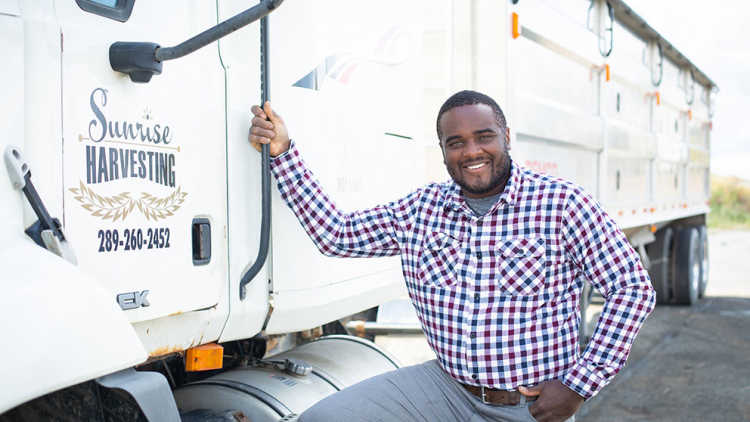Diversity in agriculture: Interview with Shane McLeod

Photo courtesy of Angela Stearns Photography.
Shane McLeod, a farmer from Ontario, shares his experience in the agriculture industry. From living in the city to owning a farm, he tells us about the opportunities and challenges he faced on his journey.
Tell us about your childhood and your journey into agriculture.
I was born and grew up in Toronto. When I was in grade 3, my mom married my stepdad and we moved out to Caledonia, Ontario. It was a big change for me. I still remember how nervous I was on my first day of school there. It took my mom about an hour of convincing to get me out of the car. I was so scared. Ironically, I met my best friend on that day. We shook hands at recess, and we’ve been friends ever since.
My stepdad has a smaller farm with about 100 acres and 30 beef cows, and I was introduced to agriculture by helping him on the farm. Then, in grade 5, I got my first job working on my neighbour’s chicken farm. I worked there twice a week before school.
In the summer of grade 7, I started working on a dairy farm. I see the owner, Ron, as more than a mentor; he is a great friend.
Every day after school, I would head to Ron’s farm and milk cows. I loved it. So I started getting more involved on his crop and dairy farm, taking on more responsibilities, learning about the business, and working additional hours before school and on the weekends. Working at Ron’s farm, I got to wear several hats and get hands-on experience.
How did you become a business owner?
In grade 11, I was offered the opportunity to rent a piece of land. I wanted to take it, but I didn’t have enough money. So, I went to Ron and told him I needed some money. He literally put his sandwich down, grabbed his chequebook and drove me to the landlord to make the payment! That’s how we became partners on my first business venture.
That’s amazing! I’m guessing you faced some challenges.
Yes, business ownership comes with its own set of challenges. Because I was new to business, nobody knew who I was and people were a bit suspicious. I had to get backing from Ron many times simply to access resources.
Cashflow was certainly one of my biggest issues. I didn’t have any cash on hand, and I had no access to credit alternatives (I didn’t know about FCC back then). So, I bought everything on credit cards because it was the only way I could move forward. Plus, I had trouble getting paid by some customers, which impacted me financially. As a result, I decided to invest in crops that would get me paid the fastest, like beans. I also opened a snowplowing business for the winter months.
Not having a farming background was also a challenge. I think a lot of people were nervous to rent to me because they didn’t know me. I always got a lot of questions about my family and my experience. They were suspicious because we don't see a lot of black people around here renting land or managing a farm. Most black people we see are migrant workers.
And when you added the fact that I couldn’t provide all the money upfront, it made it very hard for them to trust me. Fortunately, I’m a good negotiator and I always found a way to come up with the money and gain their trust.
Eventually, I started looking for different options. And that’s how I ended up farming on the Six Nations reserve. It’s close to where I live. They have some great quality land available to farm.
My landlord and I have a great partnership. With them, I have been growing consistently. About 75% of the land I farm is on the reserve. I now have two full time employees and 15 seasonal snowplow operators working with me. And, I’m a savvier business owner. I’m better equipped to negotiate and to manage my money. It’s important for me to make the most out of my investments, especially since my daughter was born.
What are your plans and hopes for the future?
After testing out organic farming this year, I realized that I could get a better yield and a better price for organic products. So I want to transition more of my land to organic.
I want to find ways to operate more efficiently by knowing how to maximize each acre of land. I’m looking to get a better fertilizer program and do some mapping to help with that. It’s about working smarter and not harder, and about making sure I keep getting high yields as I get more land.
My last goal is to grow my snowplowing business. I think farming and snowplowing work well together since they can both use the same equipment. And then I have a second source of revenue that can keep us safe whenever there’s a bad farming year.
Tell us about your experience with FCC.
There are so many things I was able to do thanks to FCC. FCC was the only financial institution that took the time to listen to my ideas and to give me a chance. When I got my first loan, I was young, I didn’t have a farming background and I definitely didn’t have the money for a down payment. It really is the only bank that understands ag and wants to help you succeed. I have developed a great relationship with Kate Hamilton (current Relationship Manager) and Jennifer Peart (previous Relationship Manager). They always find a way to help make my plans a reality. I truly think that without FCC, I wouldn’t be farming today.